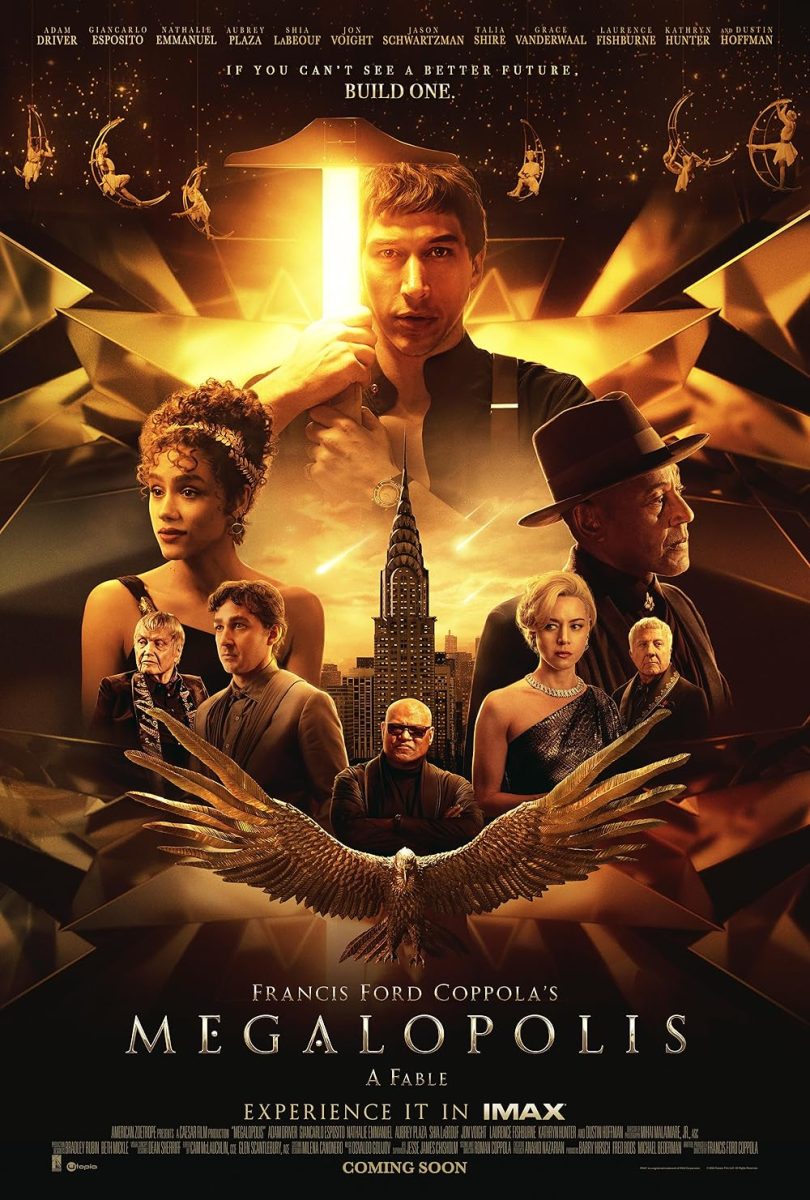I had the opportunity to see legendary filmmaker Francis Ford Coppola’s new film “Megalopolis” (2024) this past weekend in the immersive IMAX format.
Starring Adam Driver, the film follows genius architect Cesar Catilina (played by Driver) in a futuristic New York City, now named New Rome. Catilina looks to lead the city and its people into a utopian future, all while Mayor Franklyn Cicero, played by Giancarlo Esposito, seeks to keep New Rome conformed to a status quo favoring the wealthy elite.
I will be frank — there is no easy way to talk about this movie, simply because there is no other movie like it. For most of my screening, I could not believe that what I was seeing was part of an actual movie.
“Megalopolis” has some of the strangest writing, editing, acting, line delivery and music choices I’ve ever seen in a film. Half the time, I felt that many of the performers were winging it. That being said, while watching the film, I was never bored. Not once did I want to look away or detach from the story.
The performances in “Megalopolis” are all the definition of over-acting. Driver, an Academy Award nominee best known for roles in “Marriage Story” (2019), “Star Wars: The Force Awakens” (2015) and Martin Scorsese’s “Silence” (2016), is tolerable as Catilina. He’s extraordinarily passionate and committed to the role, but it didn’t click.
Nathalie Emmanuel, starring as the mayor’s daughter, Julia Cicero, is my favorite performance in the film. Her love for Cesar and loyalty to her father makes for exciting developments throughout the film. She comes off as strong-minded and witty.
The film also stars Talia Shire, Coppola’s sister and longtime collaborator, as well as Aubrey Plaza and Shia LeBeouf. Dustin Hoffman and Laurence Fishburne also have minor supporting roles. All these performances, good or bad, are hindered by Coppola’s flat and crazy writing.
Technically speaking, “Megalopolis” is the definition of middle-of-the-road. At some points, I was highly impressed with the technical achievement and filmmaking happening on the screen. Then in the next scene, I’d question if what I saw was edited in iMovie or on an old Windows computer.
“Megalopolis” had a production budget of $120 million. Compared to films like “The Creator” (2023), which was one of the most visually appealing movies this decade while being on an $80 million budget, you have to think — where was the money going during production?
Even more baffling is that Coppola spent $120 million of his own money to fund the film, selling part of his winery in California to raise funds.
Despite its lackluster filmmaking, “Megalopolis” occasionally has topical social commentary on wealth, power, the class system and sacrifices to build a utopian society. While watching the film, it’s clear what’s said reflects Coppola’s thoughts about America and the world, making for a somewhat pretentious watch.
However, just when the film starts to say something interesting, the craziest thing you’ve ever seen happens on screen and you completely forget what Coppola was trying to say.
Overall, “Megalopolis” is a jumbled mess of a film that is equally polarizing as it is fascinating.
Rating: ★★★☆☆























































































































